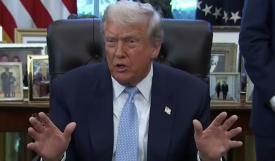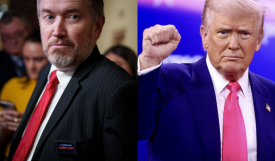United Nations General Assembly 2014: Barack Obama Speech Calls for Support to Dismantle Islamic State, Neglects Immigration
President Barack Obama's campaign to combat terrorism continued at the United Nations General Assembly on Wednesday. The president also discussed the Ebola virus outbreak and the Russian-Ukrainian crisis.
Obama said terrorism is not a new topic for the U.N. General Assembly, which opened its 69th session on Wednesday, noting how President John F. Kennedy called terrorism "not a new weapon" at the U.N. during his presidency. Obama reiterated that the U.S. "is not and never will be" in a war against Islam, recognizing the religion teaches peace and aspires individuals to live with dignity and justice.
"Collectively, we must take concrete steps to address the danger posed by religiously motivated fanatics and the trends that fuel their recruitment. Moreover, this campaign against extremism goes beyond a narrow security challenge," Obama said , adding that al Qaeda has been "methodically degraded" and the Islamic State (IS) militant group should follow suit.
According to Obama, the IS, also known as ISIL -- Islamic State of Iraq and the Levant, has "terrorized" Iraq and Syria and has used rape as a weapon of war, in addition to gun violence, starvation and mass graves.
"No God condones this terror. No grievance justifies these actions," said Obama. "There can be no reasoning -- no negotiation -- with this brand of evil. The only language understood by killers like this is the language of force. So the United States of America will work with a broad coalition to dismantle this network of death."
But Obama does not want to carry out the campaign against ISIL alone. He asked for world leaders to join the over 40 nations that have already supported the coalition. Obama also said individuals who have joined ISIL should leave the militant group.
"Those who continue to fight for a hateful cause will find they are increasingly alone. For we will not succumb to threats; and we will demonstrate that the future belongs to those who build -- not those who destroy," Obama added.
Regardless of ideology, but specifically calling to Muslim communities, Obama asked for the explicit rejection of ISIL and al Qaeda's ideology, including the funding of such extremist organizations.
Obama said, "It's time to end the hypocrisy of those who accumulate wealth through the global economy, and then siphon funds to those who teach children to tear it down. That means contesting the space that terrorists occupy -- including the Internet and social media. Their propaganda has coerced young people to travel abroad to fight their wars, and turned students into suicide bombers. We must offer an alternative vision."
Obama acknowledged the U.S. may have imperfections with it comes to ethnic tensions, referring to the police shooting of 18-year-old African American Michael Brown in Ferguson, Missouri. Obama said the world "took notice" of the "small American city" that saw a community divided.
"So yes, we have our own racial and ethnic tensions," Obama said. "And like every country, we continually wrestle with how to reconcile the vast changes wrought by globalization and greater diversity with the traditions that we hold dear."
Obama's speech to the General Assembly also mentioned the Ebola virus outbreak. He mentioned American doctors and scientists have been deployed to help contain and pursue new treatments against the virus. He urged for a broader effort against Ebola that could kill hundreds of thousands.
The president also commented on the conflict between Russia and Ukraine. Obama said Russia challenged the post-war order that "no nation can subjugate its neighbors and claim their territory." He said Russia provided arms to eastern Ukraine and fueled violence that has killed thousands. Obama also criticized Russian response to the Malaysian airliner that crashed in the eastern Ukraine region.
"America and our allies will support the people of Ukraine as they develop their democracy and economy ... We will impose a cost on Russia for aggression, and counter falsehoods with the truth," Obama said.
Obama's U.N. speech did not mention immigration. While "border" was mentioned in his 4,261-word speech, it was not in correlation to events involving Latin American countries. Meanwhile, the presidents of Bolivia, Costa Rica, Honduras and Mexico are scheduled to speak at the U.N. on Wednesday including Argentina, Chile and Dominican Republic.
UNGA - U.S. President Barack Obama Speech Transcript:
Subscribe to Latin Post!
Sign up for our free newsletter for the Latest coverage!
© 2025 Latin Post. All rights reserved. Do not reproduce without permission.














